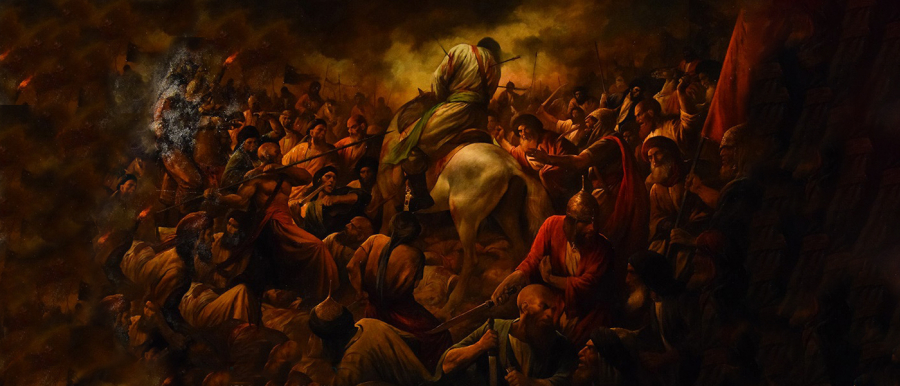There are many cruel incidents in the history of humankind, in which millions of people have been violently killed. Two of the deadliest and the most notorious wars in the history each of us know and have heard about are the First and the Second World Wars, with an ultimate death toll estimated at over 100 million people. An indisputable fact about the Second World War is that it wiped out around 3 percent of the world population at the time. Some other gruesome conflicts the world has ever seen, with large numbers of casualties, include: Chinese Civil War (1850-1864,25 million deaths), Qing Conquests (17th Century, 25 million deaths), War of Three Kingdoms, 2nd & 3rd Centuries CE, 38 million deaths), Mongol Invasions (13th & 14th Centuries, 55 million deaths), and etc.
Have you heard the names of the latter wars before? If yes, can you recall who the oppressors and the oppressed ones were? Why don’t people commemorate the anniversary of these important battles each year? Why isn't there so much passion, excitement, or motivation to honor the heroes that fought courageously in those wars?
There is one battle in the history of the human race, however, that has not faded from the memory of humans yet- after about fourteen hundred years-, is still commemorated and celebrated year after year with more passion, love, and excitement. That is the anniversary of Imam Hussain (AS) and his companions’ martyrdom at the battle of Karbala on the 10th of Muharram of the year 61 AH.
Why do you think the reason behind Imam Hussain's (AS) movement was that made it endure so long? Whereas many other wars throughout history during which millions of oppressed people have been killed, have been forgotten?!
Here are some reasons why!
The Difference Between the Leaders and Commanders in the Battle of Karbala and Other Battles
While for many leaders and commanders of wars, the only purpose is to gain victory by any means, for Imam Hussain (AS), the end does not justify the means. What mattered to him more than anything else in the battle of Karbala was the values, not the victory in its apparent sense. He never disregarded human values or committed even one minor sin to achieve his purpose.
He did not also seek out a large army to fulfill his aim, whereas most of the other commanders always try to increase their troops in wars. It is narrated in an account, on the night before Ashura, Imam Hussain (AS) asked all his companions to leave Karbala without any restrictions to save their own lives.
The Difference Between the Motives in the Battle of Karbala and Other Battles
If you take a look at the general overviews of why wars happen, you will clearly see people have been involved in wars for some common reasons over the years. Some of these reasons include: economic gain, territorial gain, nationalism, taking revenge, etc.
Imam Hussain (AS), however, fought in the battle of Karbala for none of the reasons above. He did not want to invade or conquer a city or a country, nor did he want to impose his beliefs and religion upon people. The only thing he aimed in his movement was not to be oppressed by a cruel tyrant. He was unwilling to compromise with the tyrant of his time because he had violated their very fundamental human rights. He put his life and his family at risk to recognize and maintain human dignity.
The Difference Between the Warriors and Companions
As mentioned above, while many warriors of either side of the battle have different motives to fight, like financial gains, promotions, etc., Imam Hussain (AS)’s companions in the battle of Karbala fought for no other reason than sincerely following in their Imam’s footstep and remain loyal to him. They didn’t even long for Heaven or the rewards of Hereafter. In an account, on the day of Ashura at noon prayer, one of Imam Hussain (AS)’s companions -named Saeed bin Abdullah Hanafi- saved Imam’s life, shielding him against arrows and spears thrown to him and other prayer performers. He continued doing this until the prayers finished. He then fell down before his Imam (AS), saying: “O son of the Prophet (PBUH&HP) of Allah! Have I fulfilled my promise?” “Yes! You have,” the Imam replied. Saeed bin Abdullah then left this world smiling.
And on the night before Ashura Imam Hussain (AS) once again gave all his companions the opportunity to rethink their choice and freely decide whether to stay or leave. However, they not only did not leave or escape –as many other warriors in different battles- but insisted on staying with the Imam (AS) in spite of all the dangers that were threatening their lives and families. They resisted to the last drop of their blood, and courageously declared their loyalty to their Imam (AS).

The Difference Between the Ways of Dealing with The Enemy
And finally, when it comes to the way different sides of a battle deal with their enemies, the only things that come to your mind are probably humiliation, disrespect, foul language, etc. But these are not even close to how Imam Hussain (AS) treated his enemy. He recognized his enemy’s dignity as a human being in the most challenging situations, never insulted or disrespected them, and seized every opportunity to invite them to peace and stop the war.
So these were very few reasons why Imam Hussain (AS)’s movement has not faded from our memory; because this historical event is an enlightening and life-giving truth that nurtures self-sacrificing, honest, and moral people who treat everyone with dignity and respect even when confronted with the enemy. That’s why when Arbaeen comes, about twenty million people head for Karbala since Imam Hussain (AS) and his companions did not fight for worldly desires. They fought for eternity, and for the sake of their creator, Allah Almighty.
References:
[1] https://www.historyonthenet.com/how-many-people-died-in-ww1#targetText=A%20Look%20at%20the%20Numbers,and%2010%20million%20military%20personnel.
[2] https://www.historyonthenet.com/how-many-people-died-in-world-war-2
[3] https://www.worldatlas.com/articles/deadliest-war.html
[4] http://en.wikishia.net/view/Sa%27id_b._%27Abd_Allah_al-Hanafi



















